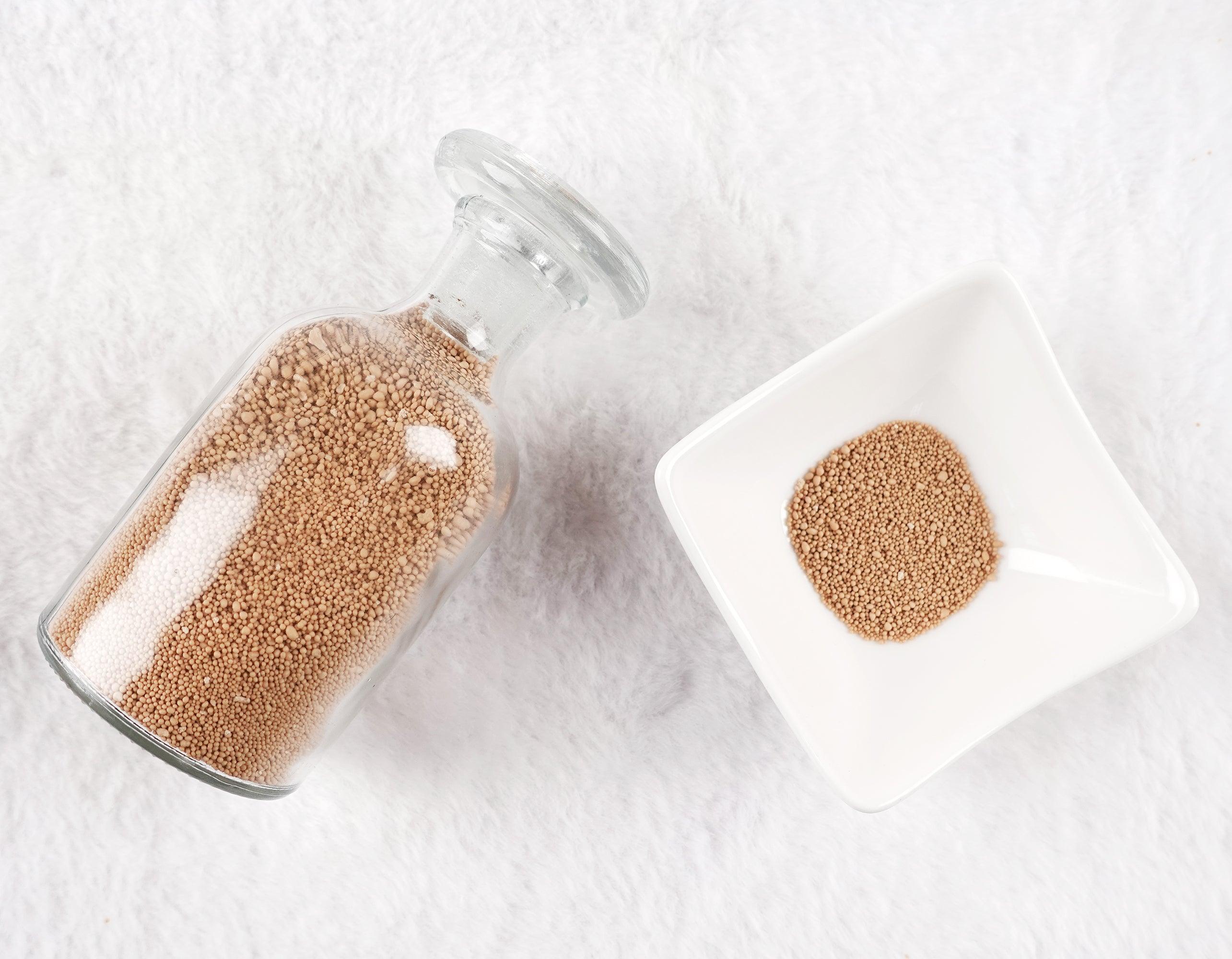Creatine is a derivative of 3 amino acids (molecules that form protein): L-glycine, L-arginine, and L-methionin. Creatine is stored naturally in the body, mostly in skeletal muscles (95%) and organs like the brain & heart(30).
It is vital for our bodies as its function is to recycle ATP (adenosine triphosphate).
ATP is the compound produced in every cell within our bodies that provides energy for various vital functions, such as muscle contraction and nerve impulse distribution.
Energy availability diminishes due to the inability to resynthesize ATP at the rate required to sustained high-intensity exercise. The more creatine in our muscles, the more our bodies can recycle ATP and endure longer (and better quality) workouts.
For this reason, creatine is one of the top supplements used within the body-building and fitness communities.
Our bodies produce small amounts of creatine (in the liver, kidneys, and pancreas), but only about 1 gram per day. We can get it from eating seafood and red meat, and obviously in supplement form which offers far greater levels than food.
Proven Results
Creatine gained popularity in the 1990’s and is now one of the most popular nutritional supplements on the market, especially for athletes. Studies have consistently shown that supplementation increases the amount of creatine in muscles, improves physical performance and post-exercise recovery(1) . The International Society of Sports Nutrition (ISSN) has repeatedly stated that creatine supplementation is safe and possibly beneficial in preventing injury(2).
Due to the improvement of muscle performance that has been observed in healthy subjects(3), there have been studies conducted to investigate the therapeutic benefits of creatine supplementation on various neuromuscular diseases and neurodegenerative disorders.
Further studies
Children with Duchenne muscular dystrophy (DMD) who were administered creatine showed better muscle contractions & less muscle fatigue(4). There was higher cellular energy and better muscle performance, as well as a higher storage ratio of creatine in muscles (in children younger than 7yrs old)(5).
Muscle strength and a reduction in bone breakdown markers was also catalogued in another study where children with DMD were given creatine supplements(6).
Laboratory tests examined the effects of creatine administered in mice with a model of Huntington’s disease (HD). Results show that although creatine given prior to symptoms showed better results, there is still significant increase in brain creatine levels even once symptoms have started to occur(7,8).
Creatine supplementation also significantly improved mice survival, it slowed the development of motor symptoms, and delayed the onset of weight loss in the treated group(9,10).
Findings in patients with Parkinson’s disease (PD) showed creatine supplementation enhanced resistance training in upper body exercises(11).
Overall, human trials have shown that creatine supplements are well accepted by the body with few-to-none side effects(12) even in patients with neurodegenerative diseases. Recently, several large-scale human trials revealed little clinical benefit on patient outcomes (with PD, HD and ALS), but there was evidence of a slowing down of brain atrophy(13). And there is overwhelming evidence that creatine supplementation increases brain creatine content by 5-15%(14,15), this is, however, less than the increases shown in skeletal muscles.
Creatine and the Brain
While the majority of research involves how creatine influences muscle & strength, there is emerging and accumulating research on how it benefits and effects our brains.
Creatine has shown some promise for reducing symptoms of concussion, mild traumatic brain injury and depression, and its impact on cognition are being investigated.
One study found that supplemented elderly patients showed improvements in the cognitive areas of number recall, spatial recall and long-term memory(16).
Subjects given creatine supplementation showed a reduction in mental fatigue when they repeatedly performed simple math calculations, potentially due to increased oxygen use in the brain(17).
Preclinical research (on rodents & humans alike) has shown that creatine supplementation, either on its own (especially in female test subjects) or in combination with pharmacological treatment, resulted in reduced depression-like symptoms(18,19). In one trial there was evidence of creatine treated mice having less severe epileptic seizures and reduced post-seizure anxiety and depressive behaviours(20).
Creatine & overall health (Ageing)
There is growing evidence that creatine also improves overall health as we age in addition to keeping muscle strength & mass and bone density(21), which is a major contributor to body ageing.
There have been reports showing antioxidant activity(22,23), improved glycaemic control(24,25,26), lowering of cholesterol levels(27), even the slowing down of certain types of cancer growths(28,29).
Creatine Monohydrate
The form of creatine that has the most studies and trialled results, is creatine monohydrate (CM). It remains one of the few nutritional supplements for which research has consistently shown benefits(30,31).
Studies show that CM is not degraded during digestion, it is taken up by muscle or organs, and excess is secreted in urine. Furthermore there are no significant side effects from CM ingestion(31).
The purest creatine on the market?
Creapure® is proven as the purest form of creatine monohydrate on the market to date, and is the only Western-source of creatine manufactured outside of China (German made).
Creapure® is on the Cologne List® (regularly tested for banned substances), is IFS FOOD certified, is suitable for vegans, and is kosher & halal certified.
My Beauty Luv is proud to be associated and registered with Creapure® in Germany and use it as one of the key ingredients in our incredible nootropic Brainy Beauty®.
- Kreider, R. B., Kalman, D. S., Antonio, J., Ziegenfuss, T. N., Wildman, R., Collins, R., … Lopez, H. L. (2017). International Society of Sports Nutrition position stand: safety and efficacy of creatine supplementation in exercise, sport, and medicine. Journal of the International Society of Sports Nutrition, 14(1).doi:10.1186/s12970-017-0173-z
- Buford, T. W., Kreider, R. B., Stout, J. R., Greenwood, M., Campbell, B., Spano, M., … Antonio, J. (2007). International Society of Sports Nutrition position stand: creatine supplementation and exercise. Journal of the International Society of Sports Nutrition, 4(1), 6.doi:10.1186/1550-2783-4-6
- Terjung RL, Clarkson P, Eichner ER, Greenhaff PL, Hespel PJ, Israel RG, Kraemer WJ, Meyer RA, Spriett LL, Tarnopolsky MA, Wagenmakers AJ, Williams MH. American College of Sports Medicine roundtable. The physiological and health effects of oral creatine supplementation. Med Sci Sports Exerc 2000;32:706 –717. doi: 1097/00005768
- Louis, M., Lebacq, J., Poortmans, J. R., Belpaire-Dethiou, M.-C., Devogelaer, J.-P., Van Hecke, P., … Francaux, M. (2003). Beneficial effects of creatine supplementation in dystrophic patients. Muscle & Nerve, 27(5), 604–610.doi:10.1002/mus.10355
- Banerjee, B., Sharma, U., Balasubramanian, K., Kalaivani, M., Kalra, V., & Jagannathan, N. R. (2010). Effect of creatine monohydrate in improving cellular energetics and muscle strength in ambulatory Duchenne muscular dystrophy patients: a randomized, placebo-controlled 31P MRS study. Magnetic Resonance Imaging, 28(5), 698–707.doi:10.1016/j.mri.2010.03.008
- Tarnopolsky, M. A., Mahoney, D. J., Vajsar, J., Rodriguez, C., Doherty, T. J., Roy, B. D., & Biggar, D. (2004). Creatine monohydrate enhances strength and body composition in Duchenne muscular dystrophy. Neurology, 62(10), 1771–1777.doi:10.1212/01.wnl.0000125178.18862.9d
- Dedeoglu, A., Kubilus, J. K., Yang, L., Ferrante, K. L., Hersch, S. M., Beal, M. F., & Ferrante, A. R. J. (2003). Creatine therapy provides neuroprotection after onset of clinical symptoms in Huntington’s disease transgenic mice. Journal of Neurochemistry, 85(6), 1359–1367.doi:10.1046/j.1471-4159.2003.01706.x
- Matthews, R. T., Yang, L., Jenkins, B. G., Ferrante, R. J., Rosen, B. R., Kaddurah-Daouk, R., & Beal, M. F. (1998). Neuroprotective Effects of Creatine and Cyclocreatine in Animal Models of Huntington’s Disease. The Journal of Neuroscience, 18(1), 156–163.doi:10.1523/jneurosci.18-01-00156.1998
- Andreassen, O. A., Dedeoglu, A., Ferrante, R. J., Jenkins, B. G., Ferrante, K. L., Thomas, M., … Beal, M. F. (2001). Creatine Increases Survival and Delays Motor Symptoms in a Transgenic Animal Model of Huntington’s Disease. Neurobiology of Disease, 8(3), 479–491.doi:10.1006/nbdi.2001.0406
- Ferrante, R. J., Andreassen, O. A., Jenkins, B. G., Dedeoglu, A., Kuemmerle, S., Kubilus, J. K., … Beal, M. F. (2000). Neuroprotective Effects of Creatine in a Transgenic Mouse Model of Huntington’s Disease. The Journal of Neuroscience, 20(12), 4389–4397.doi:10.1523/jneurosci.20-12-04389.2000
- Hass, C. J., Collins, M. A., & Juncos, J. L. (2007). Resistance Training With Creatine Monohydrate Improves Upper-Body Strength in Patients With Parkinson Disease: A Randomized Trial. Neurorehabilitation and Neural Repair, 21(2), 107–115.doi:10.1177/1545968306293449
- Bender, A., Samtleben, W., Elstner, M., & Klopstock, T. (2008). Long-term creatine supplementation is safe in aged patients with Parkinson disease. Nutrition Research, 28(3), 172–178.doi:10.1016/j.nutres.2008.01.001
- Bender, A., & Klopstock, T. (2016). Creatine for neuroprotection in neurodegenerative disease: end of story? Amino Acids, 48(8), 1929–1940.doi:10.1007/s00726-015-2165-0
- Dechent, P., Pouwels, P. J. W., Wilken, B., Hanefeld, F., & Frahm, J. (1999). Increase of total creatine in human brain after oral supplementation of creatine-monohydrate. American Journal of Physiology-Regulatory, Integrative and Comparative Physiology, 277(3), R698 R704.doi:10.1152/ajpregu.1999.277.3.r698
- Lyoo, I. K., Kong, S. W., Sung, S. M., Hirashima, F., Parow, A., Hennen, J., … Renshaw, P. F. (2003). Multinuclear magnetic resonance spectroscopy of high-energy phosphate metabolites in human brain following oral supplementation of creatine-monohydrate. Psychiatry Research: Neuroimaging, 123(2), 87–100.doi:10.1016/s0925-4927(03)00046-5
- McMorris, T., Mielcarz, G., Harris, R. C., Swain, J. P., & Howard, A. (2007). Creatine Supplementation and Cognitive Performance in Elderly Individuals. Aging, Neuropsychology, and Cognition, 14(5), 517–528.doi:10.1080/13825580600788100
- Watanabe, A., Kato, N., & Kato, T. (2002). Effects of creatine on mental fatigue and cerebral hemoglobin oxygenation. Neuroscience Research, 42(4), 279–285.doi:10.1016/s0168-0102(02)00007-x
- Allen, P. J., D’Anci, K. E., Kanarek, R. B., & Renshaw, P. F. (2009). Chronic Creatine Supplementation Alters Depression-like Behavior in Rodents in a Sex-Dependent Manner. Neuropsychopharmacology, 35(2), 534–546.doi:10.1038/npp.2009.160
- Kanekar, S., Ettaro, R., Hoffman, M. D., Ombach, H. J., Brown, J., Lynch, C., … Renshaw, P. F. (2021). Sex-Based Impact of Creatine Supplementation on Depressive Symptoms, Brain Serotonin and SSRI Efficacy in an Animal Model of Treatment-Resistant Depression. International Journal of Molecular Sciences, 22(15), 8195.doi:10.3390/ijms22158195
- Okwuofu, E. O., Ogundepo, G. E., Akhigbemen, A. M., Abiola, A. L., Ozolua, R. I., Igbe, I., & Chinazamoku, O. (2021). Creatine attenuates seizure severity, anxiety and depressive-like behaviors in pentylenetetrazole kindled mice. Metabolic Brain Disease, 36(4), 571–579.doi:10.1007/s11011-021-00684-w
- Candow, D. G., Chilibeck, P. D., & Forbes, S. C. (2013). Creatine supplementation and aging musculoskeletal health. Endocrine, 45(3), 354–361.doi:10.1007/s12020-013-0070-4
- Lawler, J. M., Barnes, W. S., Wu, G., Song, W., & Demaree, S. (2002). Direct Antioxidant Properties of Creatine. Biochemical and Biophysical Research Communications, 290(1), 47–52.doi:10.1006/bbrc.2001.6164
- Rakpongsiri, K., & Sawangkoon, S. (2008). Protective Effect of Creatine Supplementation and Estrogen Replacement on Cardiac Reserve Function and Antioxidant Reservation Against Oxidative Stress in Exercise-Trained Ovariectomized Hamsters. International Heart Journal, 49(3), 343–354.doi:10.1536/ihj.49.343
- GUALANO, B., DE SALLES PAINNELI, V., ROSCHEL, H., ARTIOLI, G. G., NEVES, M., DE SÁ PINTO, A. L., … LANCHA, A. H. (2011). Creatine in Type 2 Diabetes. Medicine & Science in Sports & Exercise, 43(5), 770–778.doi:10.1249/mss.0b013e3181fcee7d
- Op’t Eijnde B, et al. Creatine supplementation increases soleus muscle creatine content and lowers the insulinogenic index in an animal model of inherited type 2 diabetes. Int J Mol Med. 2006;17(6):1077–84
- Alves, C. R. R., Ferreira, J. C., de Siqueira-Filho, M. A., Carvalho, C. R., Lancha, A. H., & Gualano, B. (2012). Creatine-induced glucose uptake in type 2 diabetes: a role for AMPK-α? Amino Acids, 43(4), 1803–1807.doi:10.1007/s00726-012-1246-6
- Earnest, C. P., Almada, A. L., & Mitchell, T. L. (1996). High-Performance Capillary Electrophoresis-Pure Creatine Monohydrate Reduces Blood Lipids in Men and Women. Clinical Science, 91(1), 113–118.doi:10.1042/cs0910113
- Campos-Ferraz, P. L., Gualano, B., das Neves, W., Andrade, I. T., Hangai, I., Pereira, R. T. S., … Lancha, A. H. (2016). Exploratory studies of the potential anti-cancer effects of creatine. Amino Acids, 48(8), 1993–2001.doi:10.1007/s00726-016-2180-9
- Patra, S., Ghosh, A., Roy, S. S., Bera, S., Das, M., Talukdar, D., … Ray, M. (2011). A short review on creatine–creatine kinase system in relation to cancer and some experimental results on creatine as adjuvant in cancer therapy. Amino Acids, 42(6), 2319–2330.doi:10.1007/s00726-011-0974-3
- Kreider, R. B., Jäger, R., Purpura, M. .(2022). Bioavailability, Efficacy, Safety, and Regulatory Status of Creatine and Related Compounds: A Critical Review, 14(5), 1035. doi:10.3390/nu14051035
- Jäger, R., Purpura, M., Shao, A., Inoue, T., & Kreider, R. B. (2011). Analysis of the efficacy, safety, and regulatory status of novel forms of creatine. Amino Acids, 40(5), 1369–1383.doi:10.1007/s00726-011-0874-6





